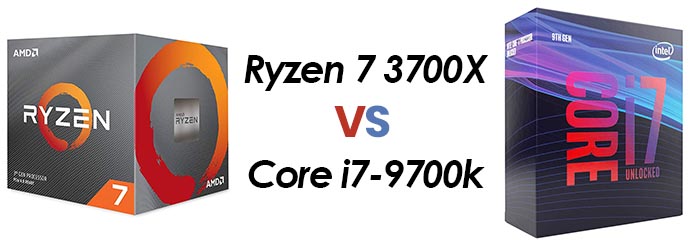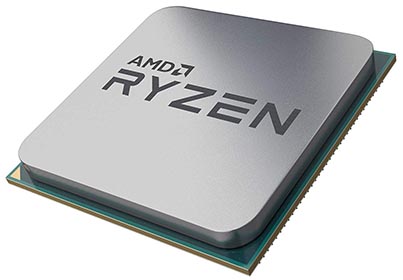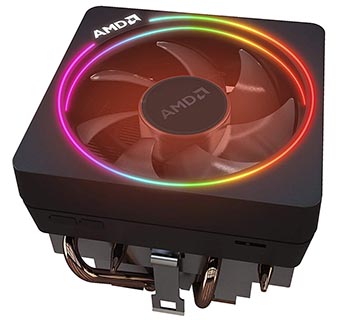AMD has long been the budget alternative to Intel.
The Ryzen 7 3700X is AMD’s answer to the Intel Core i7-9700k, which has ruled the under-$400 CPU space.
The price separation between the two is nearly enough to fit 16GB of DDR4 in between.
With a lower price yet twice as many threads, does the 3700X win out? Read on to find out.
Gaming Performance
At 1080p, the 9700k holds a 5-10% framerate edge in most gaming benchmarks.
At 1440p, the difference shrinks to a 5% or lower lead on average for the 9700k.
If you plan to game at 4k, 3440×1440, or another very high resolution, expect the difference to be minimal.
Either CPU will be capable of delivering close to the maximum possible performance of CPU’s today.
Only slight gains will be had by stepping up to a Ryzen 9 3900X or i9-9900k. Both of those CPU’s cost closer to $500.
Multimedia Performance
Both the 3700X and 9700k are 8-core CPU’s. While the 9700k has 8 threads, the 3700X has 16 – just as with the more expensive 9900k.
Taking advantage of the extra cores will depend on the task being performed.
Rendering, video encoding, compression, and encryption can generally use as many threads as you can throw at them.
This is an area where the 3700X shines, and far outperforms the 9700k. Expect a time reduction anywhere from 20-50% in performing some of these tasks.
Games make use of 8 threads or less, but with 16 threads, half are free for other tasks.
This makes streaming another good use case for a CPU like the 3700X with a lot of threads. If you plan to stream on Twitch or another platform while playing 3D-intensive games, your games will be smoother and suffer less of an FPS hit.
So we’ve outlined that streamers and those who plan to render, encode video, compress, or encrypt frequently will see an advantage with the 3700X.
Most other tasks like web browsing, office apps, and photo editing simply won’t put the extra threads of the 3700X to use.
Both the 3700X and 9700k have identical base clock speeds of 3.6GHz, but the 9700k clocks in at 5.0GHz Turbo versus the 3700X’s 4.4GHz Max Boost.
Due to this difference in max clock speeds, productivity apps generally perform better on the 9700k – to the order of about 5-10% faster in benchmarks.
Bottom line – 3700X leads for streaming and heavily threaded apps like rendering, encoding, and compression; 9700k leads in everything else.
Temperature & Cooling
The 3700X is far more efficient than its AMD predecessors. That said, Intel has made bigger temperature improvements than AMD in the last couple of generations.
Temperatures of 70°C at heavy load are typical for the 3700X, while the 9700k runs closer to 65°C.
When overclocked, the 3700X can see temps of 80°C or higher. Compare this to overclocked temps of below 75°C for the 9700k.
New CPU’s can handle high temps, but this does contribute to the overall heat output and noise level of your system. Fans need to spin up higher to better dissipate the heat.
If noise level and heat output are big concerns of yours, the 9700k does a better job at keeping its temps down.
Power Usage
Earlier Ryzen CPU’s were pretty power-hungry.
That has changed with the 3000 series.
The third-generation Ryzen 3700X has a very low 65W TDP compared to the older 2700X or 3800X’s 105W. Power draw is much lower at both idle and load.
Compared to the 9700k, idle power draw is a few watts higher. Under load, though, the 3700X’s power consumption is as much as 30W lower.
One note is that ExtremeTech found that power consumption is higher using X570 motherboards than X470 boards. This may be fixed through a BIOS update in the future. For now, power draw is still lower with the latest Ryzen CPU’s on an X570 board, but not as much so as with X470 models.
The 3700X stands as the more efficient CPU under load.
Overclocking
Gone are the AMD Athlon days of massive overclocks. A lot of this has to do with the addition of more and more cores.
The 3700X isn’t much of an overclocker. Expect to see about an extra 100MHz if you choose to overclock with air or a basic water cooling setup.
I’d personally recommend not bothering with your own overclocking if you pair the 3700X with an X570 motherboard.
Precision Boost Overdrive (PBO) will automatically overclock the CPU when possible, and keep the clock speed and power usage lower when it’s not needed.
The 9700k does a little better with overclocking. Most samples will overclock to 5200MHz. This amounts to a gain of just a few percent. However, it puts the performance pretty close to a stock-clocked 9900k in any apps where its additional threads aren’t put to use (games and photo editing, for instance).
When overclocked, the 9700k extends its lead a bit further ahead of the 3700X in games.
Value
As of this writing, street prices were about $50 cheaper on the 3700X. This is nearly significant enough to pay for an SSD or RAM for your build, and not to be overlooked.
On top of that, it ships with a CPU cooler.
A good CPU cooler.
There’s no need to replace AMD’s bundled CPU heatsink/fan unless you plan to use water cooling.
Intel, as usual, does not bundle a cooler. Adding something equivalent to the Wraith Prism cooler that AMD provides will cost you another $30-40.
That moves the price gap to $80-90 dollars, or about 25% higher cost for the 9700k.
Finally, compare AMD and Intel motherboards side by side. You’ll find AMD boards with identical features are cheaper as well.
All said and done, you could be looking to save a bit over $100 by going with a 3700X system over a 9700k build.
Conclusion
You really can’t go wrong with either the 3700X or the 9700k. They fit into a great price point where you’re getting near to top-end performance without spending a fortune.
Here’s where I think each CPU stands out. Figure out what matters most to you and pick accordingly.
- Overall Value
- Streaming
- Video Editing
- Encoding & Compression
- Low Power Consumption
- Gaming
- Photo Editing
- Office Applications
- Overclocking
- Lower Temperatures



